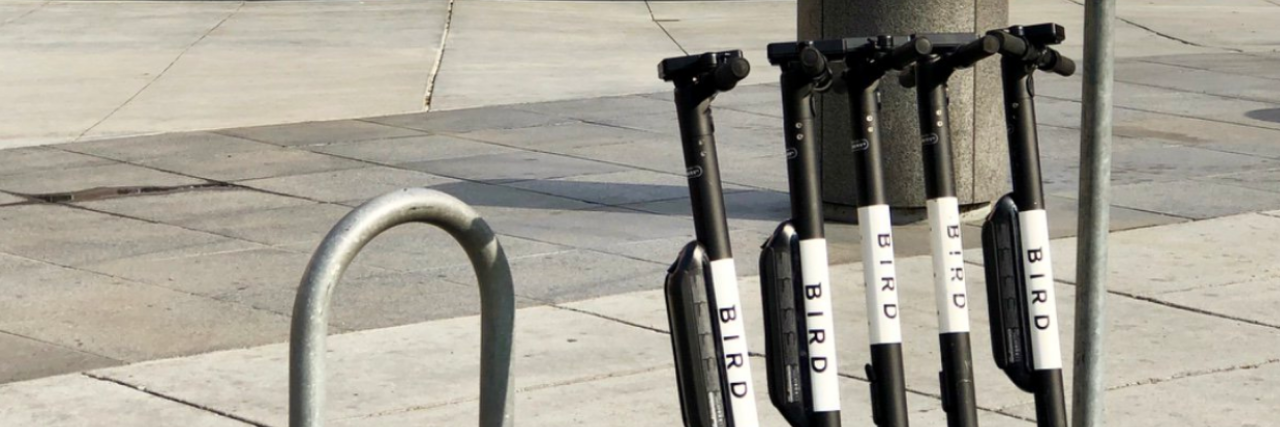Motor Scooter Companies, San Diego Are Violating the Americans With Disabilities Act, Lawsuit Claims
Disability Rights California has filed a lawsuit in federal court over public-use motorized scooters in San Diego. The rights group claims the scooters violate the Americans With Disabilities Act (ADA) because they’re often left strewn about sidewalks and other public pathways, preventing safe and easy passage for those with disabilities as required by law.
The class-action lawsuit names two scooter companies, Bird and Lime, as well as the city of San Diego. The scooters are left blocking accessible pathways, so the city is failing to meet its ADA obligations, Ann Menashe, Disability Rights California attorney told The Mighty.
According to the lawsuit written by the legal counsel for the plantiffs, the scooter companies have used the city’s sidewalks, crosswalks, transit stops, curb ramps and other walkways for profit but have disregarded the safety and rights of people with disabilities.
Bird and Lime scooters are commonly found in major cities across the U.S. According to Bird’s website, the company’s goal is to lessen traffic congestion and environmental effects of cars by “providing people with a safe, affordable and environmentally friendly alternative to cars.”
If you’re unfamiliar with these scooters, they’re motorized scooters people can pick up along sidewalks around a city. Through an app, users scan a code on a scooter to start it. After they’re done riding, users can hop off anywhere they please, leave the scooter and end their ride through the app. With Bird, users must take a photo of where they park the scooter.
While the scooters may be an easier way to maneuver overcrowded cities for many, they’ve created dangerous obstacles for some with disabilities, especially those who use mobility devices or have a visual impairment. It’s not uncommon to find unattended fallen scooters across sidewalks.
“People with disabilities should not have to stay in their houses because they are afraid to venture out the door due to scooters blocking their pathway everywhere they go,” Menasche said in a statement. “They have a right to use the city sidewalks just like everyone else who lives or visits here.”
Bird states on its site that the scooters should not be ridden on sidewalks but should use bike lanes. The company says to park the scooters near bike racks if available but to not block public pathways. Lime reiterates the parking rules in its instruction video. The Mighty reached out to both Bird and Lime and has heard back from Lime.
While Lime cannot comment on the lawsuit, a representative said safety is important to the company:
Public safety has always been at the very core of everything we do at Lime. From Lime’s “Respect the Ride” campaign — which is focused on educating riders on responsible riding, to our development of built-in sensor technology to detect if a rider is abiding by local riding laws, we are committed to keeping our communities safe for everyone.
Though the companies have rules, not everyone seems to follow them, and it’s unclear how Bird or Lime enforce them, especially when the scooters sit unattended in public spaces. One of the four plaintiffs named in the case, Alex Montoya, a triple amputee who uses prosthetics, has experienced safety concerns as a result of the scooters, according to the lawsuit.
“As a result of the proliferation of dockless scooters on public sidewalks, Mr. Montoya now will avoid walking somewhere if he can, as he does not feel safe walking,” the attorneys for the plaintiffs wrote. “Mr. Montoya, as well as his special-needs brother, have nearly tripped over discarded scooters, as the scooters are strewn all over the sidewalk.”
Do you have a disability and live in a city where these scooters are available? Tell us about your experience by posting a Thought on The Mighty or comment below.
Photo via Twitter

